The New Theater 650 TV Tuner Solution from ATI
by Josh Venning on June 14, 2006 4:00 AM EST- Posted in
- Smartphones
- Mobile
CPU Utilization
With any computer application, there will be a portion of the CPU allocated for it depending on the type of task it is performing. The amount of CPU power used while an application is running is known as the CPU overhead, and we were interested in what kind of overhead we would see while using these tuners, since recording a program is something that should ideally be able to be done in the background while performing other tasks on your computer.
We used the windows task manager to get a general measurement of CPU usage during three different states with each of these cards. The first was while simply watching live TV on the system, then while watching TV and recording simultaneously, and lastly, while recording live TV in the background (with WMCE closed) and no other programs running. We also measured the amount of CPU usage while the system was idle just to verify that it was the expected 0%, and it was. Here are our CPU utilization results.
We can see that the Theater 550 and 650 show similar results, which makes sense as the 650 is based off of the 550. We see significantly higher CPU usage with the DualTV, particularly while watching and recording live TV, but this is because we are able to watch a different channel than the one we are recording. Had we installed a second Theater 550 or Theater 650 card and used it to watch another channel, we have no doubt the CPU usage would have gone up as well. It is possible one of ATI's partners could include two tuners on one board to provide a solution similar to NVIDIA's DualTV, but for those not interested in multitasking, the Theater 650 does offer some benefits over the competition (as you will see in the next section).
With any computer application, there will be a portion of the CPU allocated for it depending on the type of task it is performing. The amount of CPU power used while an application is running is known as the CPU overhead, and we were interested in what kind of overhead we would see while using these tuners, since recording a program is something that should ideally be able to be done in the background while performing other tasks on your computer.
We used the windows task manager to get a general measurement of CPU usage during three different states with each of these cards. The first was while simply watching live TV on the system, then while watching TV and recording simultaneously, and lastly, while recording live TV in the background (with WMCE closed) and no other programs running. We also measured the amount of CPU usage while the system was idle just to verify that it was the expected 0%, and it was. Here are our CPU utilization results.
Theater 650 Watching Live TV:
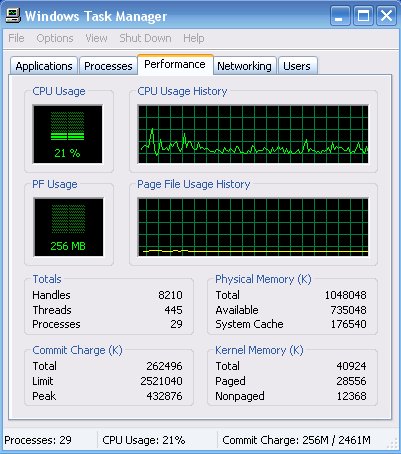

Theater 650 Recording Only (not watching):
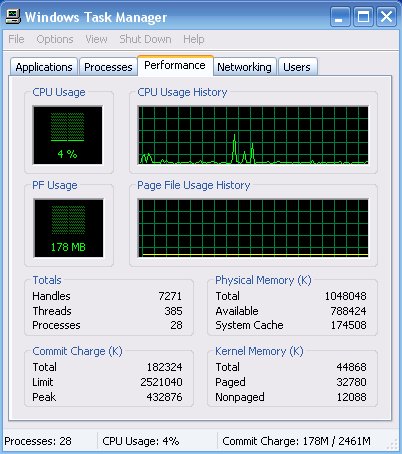

Theater 650 Watching and Recording:


Theater 550 Watching Live TV:
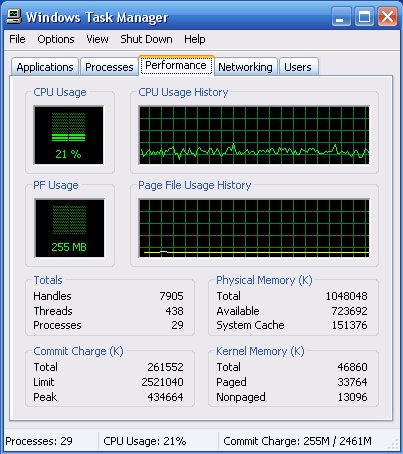

Theater 550 Recording Only:
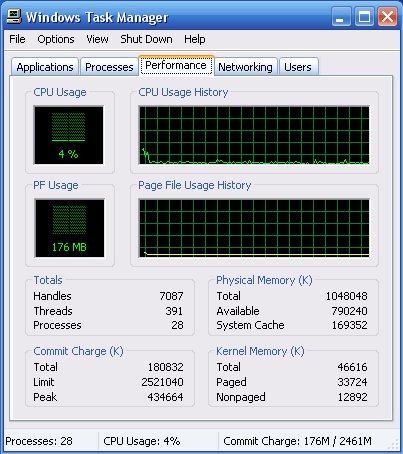

Theater 550 Watching and Recording:


DualTV MCE Watching Live TV:
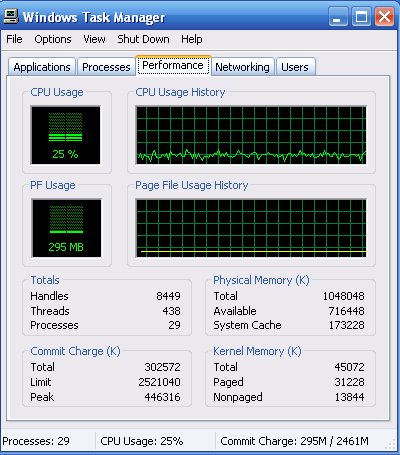

DualTV MCE Recording Only:
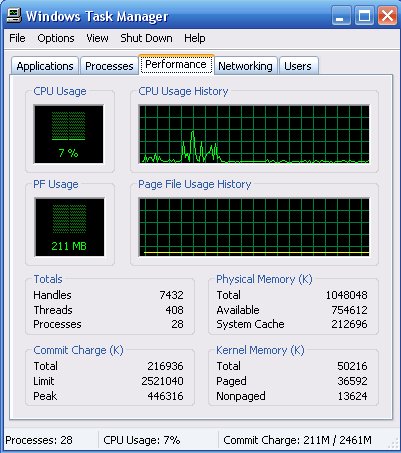

DualTV MCE Watching and Recording:


| CPU Utilization Summary | |||
| Watching Live TV |
Recording | Watching + Recording |
|
| NVIDIA DualTV MCE | 25% | 7% | 35% |
| ATI MSI Theater 550 Pro | 21% | 4% | 29% |
| ATI MSI Theater 650 Pro | 21% | 4% | 25% |
We can see that the Theater 550 and 650 show similar results, which makes sense as the 650 is based off of the 550. We see significantly higher CPU usage with the DualTV, particularly while watching and recording live TV, but this is because we are able to watch a different channel than the one we are recording. Had we installed a second Theater 550 or Theater 650 card and used it to watch another channel, we have no doubt the CPU usage would have gone up as well. It is possible one of ATI's partners could include two tuners on one board to provide a solution similar to NVIDIA's DualTV, but for those not interested in multitasking, the Theater 650 does offer some benefits over the competition (as you will see in the next section).










78 Comments
View All Comments
JarredWalton - Wednesday, June 14, 2006 - link
The T650 does support DTV (see page 2). Also note that SDTV is still digital in nature, so what you really mean is that all new analog tuners keep coming out. Even when we are all running 100% DTV, we will still have lower resolution broadcasts (unfortunately). Anyway, reviewing cards that do DTV reception is more of a case of reviewing software and interfaces as opposed to hardware; as long as the signal is strong enough to get reception, you get the pure digital content. I suppose better tuners might somehow deal with lower quality signals, but there's only so much that can be done before you just can't reconstruct an image. (I can't test OTA DTV in my location because I don't get reception - at all. Good thing I can get HDTV via Comcast... though I wish there were more HD content as opposed to SDTV, and more HD channels would be nice as well.)scavio - Wednesday, June 14, 2006 - link
Digital does not equal HDTV. Analog does not equal SDTV. Fortunately, the well paid folks at ATI know a lot more about where TV is going than you do.DigitalFreak - Wednesday, June 14, 2006 - link
Again..."Basically, the Theater 650 provides digital TV support in ATSC (Advanced Television Systems Committee) for US, Canada, Mexico, and South Korea,"
If you can pick up an HDTV station, this card can tune it in.
DigitalFreak - Wednesday, June 14, 2006 - link
Uh... Did you read the article? The card DOES support HDTV. For some reason, AT did not review that part of the card.JarredWalton - Wednesday, June 14, 2006 - link
As far as I know, the http://www.anandtech.com/multimedia/showdoc.aspx?i...">two HD cards in this review represent the only QAM capable cards currently on the market (not counting earlier versions as separate cards). Rather unfortunate, though the Fusion5 has gotten a bit better in the past 6 months.fanbanlo - Wednesday, June 14, 2006 - link
This is indeed a much better review. Hope to see a follow up once the Catalyst MMC is available.Thank you.
defiantsf - Wednesday, June 14, 2006 - link
Can't wait to get this new card even though I have the HDTV Wonder already. Would the Wonder and the T650 work together to effectively give me two tuners for watching and recording two different channels?Regarding MPEG-4 AVC/H.264 encoding via the MMC, will it be real-time or need to be transcoded non-realtime from MPEG-2? Hardware based or uses the CPU to do so? AVC is of utmost interest to me since I want a PC-based SD/HD video server for my HDTV :)
Looking forward to the MMC follow-up review!
darkfoon - Wednesday, June 14, 2006 - link
I'm really interested in purchasing one of these, however, I do not plan on making a dedicated Media Center PC, so I wonder if this will work with a computer that doesn't have windows XP MCE(I prefer to use win2k, personally) ?So, will it work with, for example, Sage TV on a "regular" desktop?
DerekWilson - Wednesday, June 14, 2006 - link
Beyond TV 4.3 released last week supports the new Theater 650 in both digital and analog mode.darkfoon - Wednesday, June 14, 2006 - link
Will there be support by any of the free TV viewing applications?